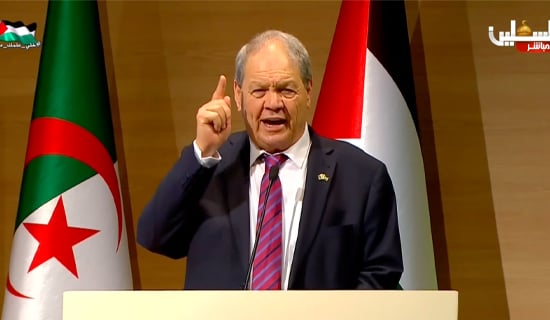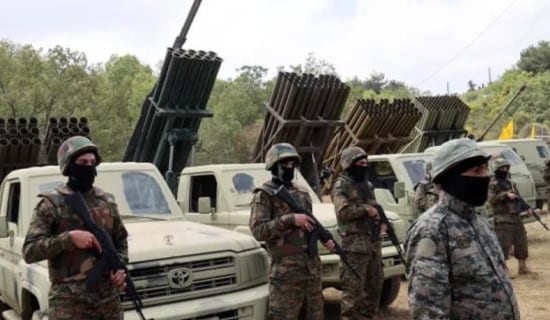
(Image courtesy: www.thehindu.com, India, November 25, 2011)
Introduction
In November 2011, the Pakistani cabinet agreed to grant India the trade status of Most Favored Nation (MFN) in order to ease trade restrictions between the two countries. India granted MFN status to Pakistan 15 years ago. As part of this move, Pakistan is required to lift barriers on imports from India, and it is hoped that bilateral trade will jump from the current $2.6 billion to $ 6-8 billion in just a few years.[1]
It was expected that the granting of MFN status would bring about a "paradigm shift"[2] in the bilateral relations of the two nuclear rivals, but Pakistani religious parties and militant groups such as Jamaat-e-Islami and Ahle Sunnat wal Jamaat and Jamaatud Dawa (the charity wing of banned jihadist organization Lashkar-e-Taiba) are opposing the move, saying that India could never become a "Favorite Nation" to Pakistan. The Pakistani military establishment has also expressed its reservation on the matter.
In recent weeks, Jamaatud Dawa and Jamaat-e-Islami have organized countrywide protest rallies to oppose the decision to grant MFN status to India, warning that "a tsunami of the people of Pakistan would throw pro-India and pro-America ruling lobby out of power if they tried to bargain over the blood of millions of Kashmiri freedom-fighters and martyrs."[3] Meanwhile, it is not clear if the Pakistani government has officially communicated its decision to India.
Jamaat-e-Islami Emir: "Pakistani Rulers Want to Repeat the History of East India Company, Which Occupied the Whole of India"
Syed Munawwar Hasan, the Emir of Jamaat-e-Islami Pakistan, called for a nationwide protest after the Friday prayer on November 18 to protest against Pakistan's decision to grant MFN status to India.
According to an Urdu-language daily, Hasan said:[4]
"Pakistani rulers want to repeat the history of East India Company, which occupied the whole of India by taking away rule from the hands of Muslims in the name of trade, by granting MFN status to India at the behest of the U.S….
"Doing business with India is like forsaking one's independence and sovereignty; and it is like giving away the nation to the scheming Hindus, who have not let go any opportunity to harm Pakistan…
"The people of Pakistan can bear hunger, but cannot bear Indian supremacy at any cost…"
The central council of the Jamaat-e-Islami's women's wing, at a meeting in Lahore, passed numerous resolutions against granting MFN status to India. According to a report on an Urdu-language website, the resolution said:
"The decision to give MFN status to India was not taken under the consideration to boost business with India. but it has been taken under U.S. pressure… The U.S. wants India to play a special role in Afghanistan and wants to develop India as a powerful political and economic opposition to China in the region…
"This decision will not only harm the Kashmir cause, but also badly affect the local industries and production, and Pakistan would be reduced to a market for Indian goods.[5]
Islami Jamiat-e-Talaba, student wing of Jamaat-e-Islami, at a meeting in Lahore, said that the people of Pakistan would not accept a hand of friendship towards India. Syed Abdur Rasheed, the chief of Islami Jamiat-e-Talaba, said:[6]
"The UN has accepted the basic right of plebiscite to the Kashmiris, and Pakistan has always supported it. It is not acceptable for the Pakistanis to accept friendship with India keeping the Kashmir issue at the backburner…
"More than 750,000 Indian troops have been unleashing inhuman tyranny on the unarmed Kashmiris. Occupied Kashmir presents a scene of military camp and extending hands of friendship in such circumstances is like betrayal to the 350,000 martyrs [in Kashmir]."
In Mosque Sermon, Jamaat-e-Islami Chief Calls to Stop the Advance of Zionists and Hindus on Pakistani Nuclear Assets
Islamic clerics and Khateebs (who deliver sermon in mosques) also denounced the Pakistani government for what they called its "anti-state" decision on granting MFN status to India.[7] The clerics delivered sermons following a call by the leaders of Jamaat-e-Islami and Jamaatud Dawa.
Syed Munawar Hasan, during a Friday sermon, urged the Pakistani nation to rise up in order to check the advance of the Zionists and Hindus towards the country's nuclear assets.[8]
According to a Pakistani media report, Hasan also urged the nation to launch a vigorous movement to get rid of "the U.S. and its slaves ruling the country," failing which the rulers would surrender Pakistan's independence.[9]
The Jamaat-e-Islami leader also said: "Rulers were out to place the country under American and Indian slavery by keeping the nation in the dark…
"The commerce secretaries of the two countries [India and Pakistan] had already worked out the details of the items of trade between the two countries, but Prime Minister [Yousuf Raza] Gilani appeared to be deceiving the nation on the issue…"[10]
Jamaatud Dawa Leaders Oppose MFN, Express Support for Kashmir Cause
Religious parties and militant groups like Jamaat-e-Islami and Jamaatud Dawa (which is accused of being behind the 2008 Mumbai terror attacks) and Ahle Sunnat wal Jamaat, the front for the banned militant group Sipah-e-Sahaba Pakistan, staged countrywide protests on November 18 against the decision to grant MFN status to India.
According to a Pakistani daily, these organizations warned the Pakistani rulers to avoid their pro-U.S. and pro-India policies and withdraw MFN status from India, warning that otherwise the masses will evict them from power.[11]
Addressing the protesters, senior Jamaatud Dawa (JuD) leader Amir Hamza said:[12]
"Jamaatud Dawa Emir Hafiz Mohammed Saeed has assured [Kashmiri leader Ali Shah] Geelani that the JuD would oppose any move to give India MFN-status…
"When Pakistan announced that it might award MFN status to India, Geelani called Hafiz Muhammad Saeed and he reassured Geelani that we will not leave Geelani alone... India can never be a most favorite nation for Pakistanis."
Abdul Rehman Makki, the Deputy Emir of Jamaatud Dawa and a close aide of Hafiz Muhammad Saeed, said: "If this decision [to award MFN status to India] is not reversed, then those who are responsible for this decision will have to get reversed."[13]
Jaish-e-Muhammad and Lashkar-e-Taiba Hold Anti-India Rally in Pakistani Kashmir
Hundreds of members of banned terror groups like Jaish-e-Muhammed (JeM) and Lashkar-e-Taiba (LeT) and LeT's charity arm Jamaatud Dawa also joined a protest rally in Pakistani Kashmir on November 25, to protest against the Pakistani government's decision to give MFN status to India.
Jamaatud Dawa leader Abdul Aziz Alvi, who was briefly detained by Pakistani authorities in the aftermath of the 2008 Mumbai attacks, told the protestors: "We will never accept this decision."
The protest rally was held in the main square of Muzaffarabad, the capital of Pakistani Kashmir. According to an Indian website,
"At the PoK [Pakistan-occupied Kashmir] rally, protesters - mostly members of the JeM, the JuD and the Jamaat-e-Islami - shouted slogans against the Pakistan government and India…. They were joined by supporters of the main opposition Pakistan Muslim League-Nawaz."[14]
Jamiat Ulema-e-Pakistan Leader: "Pakistan-India Borders Do Divide the Two Countries, But They Also Denote Two Different Ideologies"
According to a report on the website of the Urdu-language newspaper Roznama Jang, Maulana Aurangzeb Farooqi, the central information secretary of Ahle Sunnat wal Jamaat, also criticized the decision.
Farooqi said: "National interest comes first, and MFN status to India without the resolution of the Kashmir issue is against the national interest… We will oppose this on every front… Kashmir is the lifeline of Pakistan, and we would not allow our lifeline to be given to the enemy [India]." [15]
Senior leader of Jamiat Ulama-e-Pakistan (JUP) Dr. Mohammad Siddiq Rathor said: "Pakistan-India borders do divide the two countries, but they also denote two different ideologies."[16]
The JUP leader said that granting MFN to India despite "India's terrorist activities in Pakistan is like enmity with the nation," and added: "Ideological war cannot end under external pressure while India has inflicted irreversible loss to Pakistan since its inception."[17]
Pakistan Army: "MFN Status for India is Not in Line with Pakistan's Security Policy in Afghanistan"
The Pakistan Army also expressed its reservation over the Pakistani civilian government's conferring MFN status to India, and conveyed its concern to the administration at the highest level, according to an Indian website.[18]
The website, quoting the BBC's Urdu Service, reported that Pakistani military leaders have said that new contacts with India should be viewed in the context of the situation in Afghanistan.
The report quoted a senior Pakistani official privy to the army's interaction with the civilian government as saying: "Military officials are of the opinion that MFN status for India is not in line with Pakistan's security policy in Afghanistan."[19]
The Indian website report further added: "Military officials had advised the political leadership not to act in haste in trade relations with India… The powerful military establishment, which guides Islamabad's defense and foreign affairs, believes Pakistan and India would be in competition for trading opportunities after the U.S. withdraws its troops from Afghanistan."[20]
Kashmiri Separatist Leader: "If Pakistan Reaches Any Agreement with India against the Wishes of Kashmiri People… Pakistan will Not Remain Safe"
In Indian Kashmir, Syed Ali Shah Geelani, chairman of the All Parties Hurriyat Conference (APHC-Geelani), warned Pakistan against conferring India with MFN status, saying that any step that goes against the aspirations of Kashmiri people and will land the country into big trouble.
According to a Pakistani website, Geelani said: "As the Kashmiri nation, we will never acknowledge such policies. If Pakistan reaches any agreement with India against the wishes of the Kashmiri people vis-à-vis Kashmir dispute, then Pakistan will not remain safe."[21]
Addressing a public gathering at Iqbal Park in Sopore town of Jammu & Kashmir, Geelani said: "We are fighting against the Indian rule for the past 64 years, and are committed to fight until freedom."[22]
In Pakistani Kashmir, prominent Kashmiri leaders expressed reservations over India being granted MFN status by Pakistan.
Raja Shabbir Ahmad, chairman of the Kashmir Human Rights Organization, said: "The federal [Pakistani] government has not only betrayed the sacrifices of hundred thousand of Kashmiris but also has committed negligence towards its responsibilities by declaring India the most favored nation."[23]
Former ISI Chief Lt.-Gen. Hamid Gul: Conferring India the MFN Status was Needed More for the U.S. Than for India
According to an article in the Urdu-language Pakistani daily Roznama Ummat, Lt.-Gen. (retired) Hamid Gul, the former chief of Pakistani military's Inter-Services Intelligence (ISI), also criticized the MFN decision. In the article titled "Selling of a Nation," Hamid Gul wrote:[24]
"The love for India is so much there in the houses of power that no one is bothered about the future of the country… The irony is that not only are the opposition and the claimant of the new leadership supporting the whole process silently, but the religious leadership is also silent. The leader of Kashmiri freedom movement Syed Ali Shah Geelani is forced to ask with much pain about 'what the Pakistani community is doing' and 'where are people's representative parties?'
"Although declaring India as the most favored nation (MFN) is there with the business point of view, we are not only empowering the killing hands, which is after our lifeline, but also providing them with a dagger. Pervez Musharraf sold out the present of this nation, but this government is selling out the future also….
"Selling the nation, and for cheap; the past and present of our rulers are filled with betrayals. But giving India the MFN status is the biggest and historical betrayal until present, which not only puts a question mark to the basic theory [that India and Pakistan are separate nations], but is also a long jump towards Akhand Bharat [undivided India].
"The question is: why such haste? Why are they become so impatient? The answer would be found in the talks of Hillary Clinton's last tour of Pakistan that they 'would not tolerate any delay; steps should be taken not in months or weeks, but in days.' Our rulers, in fact, provided the favorite U.S. results in weeks and days.'There is no doubt that conferring India the MFN status was needed more for the U.S. than for India. It was a demand of the U.S. This is related to the American defeat in Afghanistan and also the future ambitions of the U.S. in South Asia as [U.S. President Barack] Obama has himself said, 'Asia would be the first priority of the U.S."
* Mirza A. B. Baig is a Senior Analyst at MEMRI's South Asia Studies Project (www.memri.org/sasp)
[1] www.economictimes.com, India, November 3, 2011.
[2] www.economictimes.com, India, November 3, 2011.
[3] www.thenews.com.pk, Pakistan, November 19, 2011.
[4] www.jang.com.pk, Pakistan, November 18, 2011.
[5] www.jang.com.pk, Pakistan, November 23, 2011.
[6] www.jang.com.pk, Pakistan, November 17, 2011.
[7] www.thenews.com.pk, Pakistan, November 19, 2011.
[8] www.thenews.com.pk, Pakistan, November 19, 2011.
[9] www.thenews.com.pk, Pakistan, November 19, 2011.
[10] www.thenews.com.pk, Pakistan, November 19, 2011.
[11] www.jang.com.pk, Pakistan, November 18, 2011.
[12] www.ibnlive.in.com, India, November 25, 2011.
[13] www.jang.com.pk, Pakistan, November 18, 2011.
[14] www.thehindu.com, India, November 25, 2011.
[15] www.jang.com.pk, Pakistan, November 21, 2011.
[16] www.jang.com.pk, Pakistan, November 21, 2011.
[17] www.jang.com.pk, Pakistan, November 21, 2011.
[18] www.indianexpress.com, India, November 22, 2011.
[19] www.indianexpress.com, India, November 22, 2011.
[20] www.indianexpress.com, India, November 22, 2011.
[21] www.sananews.net, Pakistan, November 12, 2011.
[22] www.sananews.net, Pakistan, November 12, 2011.
[23] www.jang.com.pk, Pakistan, November 27, 2011.
[24] Roznama Ummat, Pakistan, November 27, 2011.








